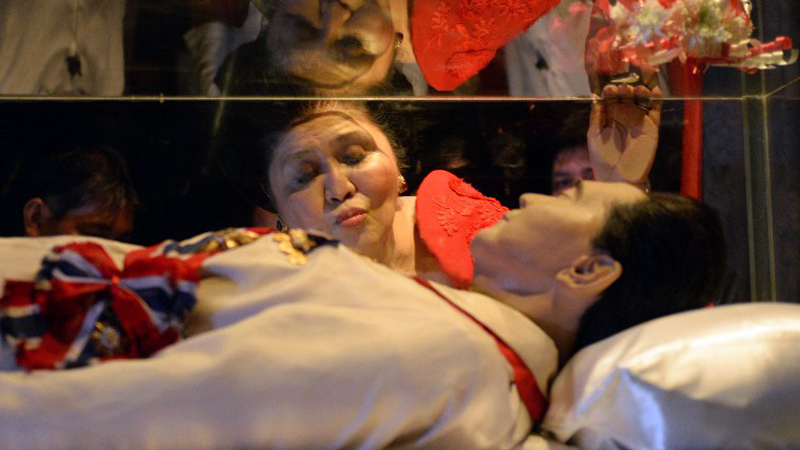
Former Philippine first lady and now congresswoman, Imelda Marcos, kisses the glass case of her late husband president Ferdinand Marcos. AFP FILE PHOTO/TED ALJIBE
PRESIDENT Duterte’s closest allies in the Senate are opposed to his decision to allow the burial of the late strongman Ferdinand Marcos at Libingan ng mga Bayani, the heroes’ cemetery where former presidents rest with fallen soldiers, even as they respect his executive prerogative.
“I have a difference of opinion with the President there. I’m just happy he announced it soon, because it is now a public debate and let us hear the opinions of everyone,” said Sen. Alan Peter Cayeteno, Mr. Duterte’s losing running mate in the May elections.
“I see the point of the President that if it’s a completely legal issue, he (Marcos) is entitled to it. But the name [of the cemetery] is Libingan ng mga Bayani. While he had heroic moments in his life, we do not consider him in totality heroic because of things that happened during martial law. Unless we change the name to Libingan ng mga Bayani at Diktador,” Cayetano said.
Senate President Aquilino “Koko” Pimentel III, the President’s party mate, said PDP-Laban members had long debated the issue of Marcos’ burial, even before Mr. Duterte’s presidential bid.
The poll was close―half were for, half were against―but with President Duterte having made up his mind, Pimentel said the party respected his decision.
“If I were President, I would not allow it. I don’t consider him a hero. But I am not the President. So we will respect the decision of the President,” he told reporters.
Sen. Leila de Lima proposed that martial law victims and their relatives come together and ask the courts to stop the impending interment of Marcos.
Class suit suggested
“I put forward the idea of a possible injunctive class suit by the victims or the families of the victims of the years of oppression and abuses during the martial law era,” De Lima told reporters on Monday.
President Duterte has said that even the late dictator had a right under the law to be laid to rest in a place reserved for heroes.
The Department of National Defense (DND), which oversees the military, has “no choice” but to comply with President Duterte’s plan to have Marcos buried at Libingan.
In a meeting with the media on Monday, DND spokesperson Arsenio Andolong expressed the department’s position that based on Armed Forces of the Philippines (AFP) regulations, Marcos was qualified to be buried in the cemetery for soldiers and dignitaries.
“He was a president, a secretary of national defense and World War II veteran,” included in the roster of the Philippine Veterans Affairs Office, Andolong said.
Andolong said Marcos would most likely be honored as a former president and not just as a soldier. “From what I understand, the burial will be based on his stature.”
Andolong declined, however, to confirm a Sept. 18 burial date, saying the details were being discussed by the Marcos family and the AFP.
Speaking on behalf of thousands of martial law victims, the Commission on Human Rights (CHR) urged the President not to push through with the burial of Marcos at Libingan next month.
Against government policy
CHR Chair Jose Luis Gascon said the late dictator’s burial in the resting place for soldiers and statesmen contravened government policy that recognized the systematic human rights abuses during martial law.
He said “as a matter of policy, there is already a law,” Republic Act No. 10368 passed in 2013, which seeks to recompense martial law victims out of the P10 billion recovered ill-gotten Swiss bank deposits of the Marcoses.
“So there is a disconnect in the message. While we are going to give reparations to the human rights victims, there is this burial at Libingan ng mga Bayani which has an impact on the message we are sending to future generations on how we treat dictators in our country,” Gascon said on Monday in a news conference.
Even Vice President Leni Robredo joined the voices opposed to the burial of Marcos at Libingan.
“How can we allow a hero’s burial for a man who plundered our country and was responsible for the death and disappearance of many Filipinos? Those who have greatly committed crimes and moral turpitude against the Filipino people cannot be buried in Libingan ng mga Bayani,” Robredo said in a statement. With reports from Dona Z. Pazzibugan and Gil Cabacungan